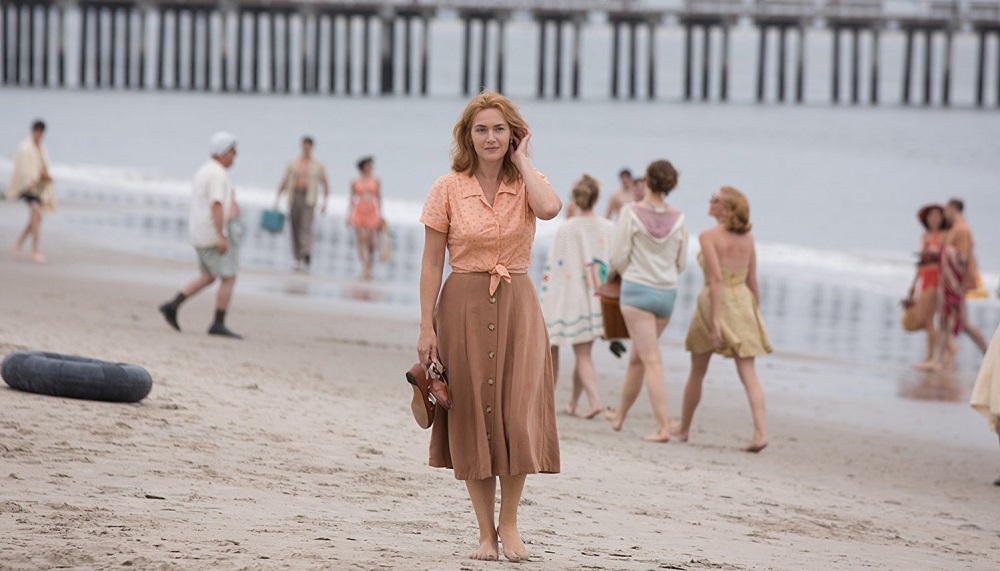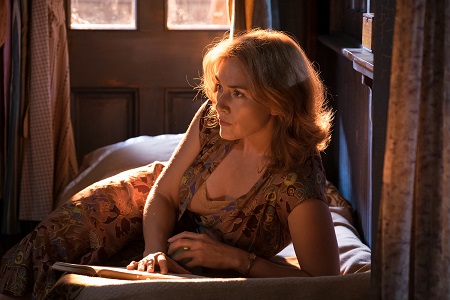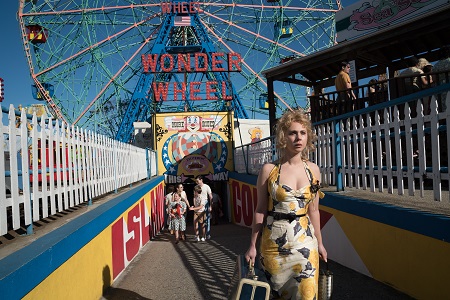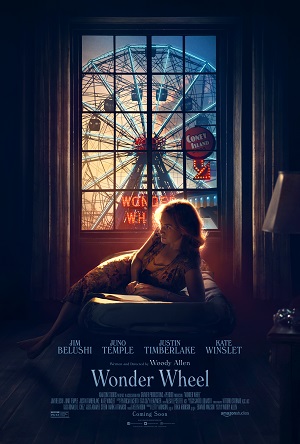
Allen’s Well-Acted Wonder Wheel an Unremarkable Trifle
Woody Allen’s Wonder Wheel never gets to the point. It hints at the point. It gives a general idea as to what the point might be. It even offers up long, skillfully structured and exquisitely shot sequences where the point is going to be made with harsh, emotionally devastating vivacity. But for whatever reason, said point never is made, the filmmaker seemingly passing over it with a rather blasé indifference that’s frustratingly unfortunate. It’s Allen running in place, retreating into ideas, themes and concepts he’s employed numerous times before, and as such his latest feels like nothing more than an underwhelming disappointment.
Don’t blame Kate Winslet. She plays Ginny, a 1950s waitress who lives with her mechanic second husband Humpty (Jim Belushi) on the Coney Island boardwalk and is slowly losing her mind when she learns 10-year-old son from her first marriage, Richie (Jack Gore), is transforming into a pint-sized pyromaniac. About to turn 40, the former amateur actress still harbors dreams of becoming a star while also fantasizing about her former husband, a jazz musician, wondering what her life would have been had they not ended up going their separate ways. All of which makes it easy for Ginny to slip into an affair with twenty-something lifeguard Mickey (Justin Timberlake), a WWII veteran who is currently in a master’s program at NYU studying to be a playwright.
Enter Carolina (Juno Temple). She’s Humpty’s estranged daughter from his first marriage, the pair not on speaking terms after she stopped going to school and married a local New York mobster when she was 20-years-old. The young woman has returned because she was forced by the FBI to turn stool pigeon, revealing her husband’s most venal secrets in order to stay out of prison. Now Carolina has a price on her head and the only person she can think of to turn to for help is Humpty, and much to Ginny’s dismay he welcomes his daughter into their home, sets her up with a job at his wife’s restaurant and starts paying for her to go to night school so she can complete her education.
Combining elements of everything from Manhattan, Annie Hall, Crimes and Misdemeanors, Mighty Aphrodite, Match Point and Blue Jasmine, Allen is mining aimlessly from many of his greatest hits. Thanks in large part to the performances of Winslet, Temple and Belushi, and owing a great deal to the marvelous visual compositions of Oscar-winning cinematographer Vittorio Storaro (The Last Emperor, Reds), the movie ends up being far more watchable and engaging than it has any right to be. At the same time, the themes at the center of this hard-hearted, venom-fueled dramatic comedy are so muted, so haphazardly developed, feeling any connection to what is happening is practically impossible. Worse, the tragic corners of this intimate character study are painted with brushstrokes that are lazy and vague, the veteran filmmaker going through the motions in a manner that made me wonder why he bothered bringing this story to the screen in the first place.
It does not help that Mickey, frequently breaking the fourth wall talking directly to the audience as he narrates the story as if he were the Chorus in a Shakespeare play like Henry V, is a poorly developed character that Timberlake never is able to get a handle on. By the time he becomes the romantic focal point for both Ginny and Carolina I’d stopped caring about anything he was doing, and what it is either woman sees in him I could never quite pinpoint. He’s just not that interesting, much of his explanatory dialogue too on-the-nose and stiltedly banal, making him a weak narrative voice easy to tune out and even easier to forget about entirely.
There is also the film’s slow waltz into unearned tragedy. While the eventual outcome for many of these various characters is not really ever in doubt, how Allen gets to his cutthroat conclusion is as infuriatingly contrived as it is emotionally insubstantial. It’s a left turn into homicidal indifference that doesn’t feel genuine, characters making decisions that, while not surprising, still don’t feel a part of anything that has transpired up to that point. Things happen more because the script needs them to and not because the characters have come to these places in their various lives naturalistically, as such the inherent power of the murderous terror that befalls certain members of this tale is devoid of cathartic urgency or emotive repugnance.
Winslet does give it her all, the veteran actress delivering a performance as Ginny that is oftentimes a thing of brazenly merciless splendor. Temple is almost equally outstanding, her bubbly demeanor concealing a complicated pathos of regretful penitence that makes Carolina’s attempts to seek forgiveness and friendship with Humpty and Ginny all the more affecting. As for Belushi, I don’t think he’s ever been better, the affection he exudes as this distraught father welcomes the daughter he was certain he’d lost forever back into his life a joyful avalanche of poetic beauty.
None of which matters. It’s as if Allen is disinterested in his own material, his unfocused meanderings from one event to the next making Ginny’s story more of an exercise in selfish materialistic excess than it is anything substantive. Thanks to Storaro, it all certainly looks terrific, and with an acting trio as wonderful as Winslet, Temple and Belushi, the majority of the performances certainly aren’t anything to scoff at. But Wonder Wheel is disagreeably monotonous no matter how strong these various elements might prove to be, Allen’s latest an unremarkable trifle I could honestly care less about.
Film Rating: 2 (out of 4)








